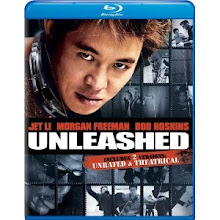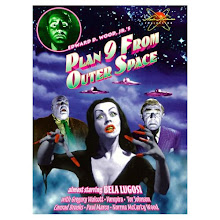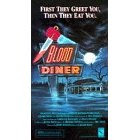Sunday, July 20, 2008
Jason's Take: "Gates of Heaven"
Roger Ebert ranks “Gates of Heaven” as one of the top 10 greatest films of all time. I disagree. But it may very well be among the top 10 most unusual films of all time.
What other documentary is more off-beat and more useless than one about a pet cemetery? Perhaps Les Blank’s “Gap-Toothed Women” (1987) could compete.
[A major but worthwhile tangent: Speaking of director Les Blank, he also directed a film that I’ve never seen called “Werner Herzog Eats His Shoe” (1980). Supposedly, it came about because Herzog told Errol Morris, the man behind “Gates of Heaven,” that if he made a documentary about pet cemeteries, he’d eat his shoe. Morris did, so Herzog eats his shoe in the Les Blank film.
And by the way, if you’re interested in seeing this feat, it’s included on the Criterion Collection’s DVD release of “Burden of Dreams” (1982), which is a story in and of itself: In 1982, Herzog made a film about a madman who wanted to build an opera house in the jungle, so he ended up dragging a boat over a mountain in order to obtain his goal. Well, madman Herzog actually did drag a boat over a mountain in order to make the film about a madman who did just that, so Les Blank’s “Burden of Dreams” is about Herzog’s filmmaking, boat feat.]
The biggest question behind “Gates of Heaven,” which I’d love to hear you all weigh in on, is what was Errol Morris trying to do? Is this intended to be a comedy, filmed at these odd and vulnerable people’s expense? Was he trying to make a thoughtful film about life after death for various living things? Is it a statement about compassion and the sensitivity of human beings? Or was it simply a story about a pet cemetery that had to dig up and move 450 dead animals?
I think the fact that a pet cemetery had to be dug up was initially Morris’ motivation to make this documentary — along with having Herzog eat a shoe. But when he encountered these gems of humanity, I think he spun it into a mocking comedy. I believe he’s making fun of these people, remarkably, without saying one word. (There is no guiding, voice-over narration in this documentary.)
Debate me if you disagree, but here are my attempts at citing proof: As we hear Floyd “Mac” McClure’s tender feelings about his inspiration for building a pet cemetery, that is edited to be interspersed with one hilarious, condescending Mike Koewler’s (the rendering company guy) commentary. And when Mac discusses his priority of putting a heart over a dollar sign, we get that dopey (albeit humorous) visual of a hand drawing a heart-over-a-dollar-sign fraction.
Then, near the end, when Danny Harberts, the guitar-playing son, jams loudly over the Bubbling Wells pet cemetery (you know, the one that was supposed to have an “atmosphere of tranquility”?) Morris and his DP, Ned Burgess, frame the shot to contain only the monstrous, blaring amplifier in the foreground and the pet cemetery in the background.
And then there were those tacky, plastic animals (no doubt, part of Bubbling Wells’ décor) during the final shots. I can’t help but think Morris was ridiculing these people. I’m not judging him for it. I’m just trying to establish the objective of this documentary.
Yet, other moments were poignant, such as the montage of head stones and their intimate, personalized messages: “I knew love. I had this dog.” and “For saving my life.” These shots were accompanied by deafening silence, which almost suggested a reverence to me.
There is an underlying sadness to this film; it isn’t as much its capture of several pet owners’ grief as it is the capture of defeated dreams: Mac, the soft-hearted “4-H man,” said it was his fondest dream to run a pet cemetery. He failed. Phil Harberts obviously didn’t intend on mowing the lawn and picking up dead animals for his father’s pet cemetery for his life’s fulfillment. We can see it on his face and hear it in his voice, somewhere between all his positive-mental-attitude philosophies. And his brother, Danny, who is already resigned to not becoming a rock star, seems to be giving up on love, too. These people were truly pitiful to me, and I think Morris exploits them a little.
We probably don’t think about pet cemeteries much, but if you’ve ever had an animal, it is true what they say: When a pet dies, it’s comparable to losing a family member. Surprisingly, burying a pet is more complicated than it seems:
One time we buried a cat, and, having the best intentions, we wrapped her in a plastic garbage bag then sealed her in a plastic storage container. Months later our vet told us we should have simply buried her in a paper bag, so her body could decompose properly. He told us that our little cat, in her present burial arrangements, would basically be “cat soup” for years to come — perhaps decades. Nice. That was a comforting thought. Where was Mac McClure when I needed him?
Roger Ebert’s “Great Movies” review of “Gates of Heaven” is entertaining. I’ve linked it, if you’re interested. Oh, and Ebert provides us with this link: http://www.bubbling-well.com/.
Subscribe to:
Post Comments (Atom)






























































2 comments:
This review was great. I want to see the movie as soon as I can. The kicker to this entire post was how deadpan your last story was. I'm sure it was somewhat of a hard thing to think of a departed pet as "cat soup" but that just got the heartiest of laughs out of me. (I'm sorry for my insensitivity) Great review and I will see this and follow up.
Hey Chris,
Thanks for your nice comment (and congratulations, by the way). You've got a great gal there with a phenomenal singing voice. You don't have to merely leave comments. You are an honored, exclusive member of this film discussion blog. Send me an e-mail to ConsideringTheCinema@gmail.com and I'll reply with the info so you can make official posts. Any man who loves Glen Phillips and movies is a friend of mine, brother. Take Care.
Post a Comment